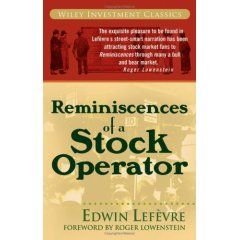Best investing books - Reminiscences of a Stock Operator
Stock-Markets / Resources & Reviews Nov 22, 2006 - 10:28 PM GMTBy: Nadeem_Walayat
|
$14 (32% discount) |
Reminiscences of a Stock Operator' by Edwin Lefèvre is probably one of the best and well known books on the subject of financial speculation, the book was published as the fictional biography of “Larry Livingston,” but is actually an biography of Jesse Livermore, one of the first famous stock & commodity traders ever. The man started trading after working as a boy in a brokerage house and trading in several of the tiny brokerages called “bucket shops” where small time traders would bet against the house, and eventually went on to become one of the most influential and widely-known traders of his day. He made, lost, and re-made millions at a time. What you will get from the book are some classic mistakes and the lessons learned from them; some of the best catch phrases in the business; insight into how the markets were manipulated then and probably still are now. One of the most important lessons mentioned in the book is that a trader does not have to be invested in the market all the time. This is the book from which almost every subsequent general trading book is derived. If you have ever wondered where the trading rule "Never average down" came from, just turn to page 154. Where did the comparison between greed and fear first originate ? Look to page 130. |
Many rules to live by that were introduced in LeFevres book are:
-The trend is your friend.
-History repeats itself
-Never average down.
-No stock is too high to buy or too low to sell.
-Let your winners run and cut your losses quickly.
Many aspects of the financial markets are still very much the same as they were in Livermore's day. As he points out, human nature is a constant, an observation that is as true today as it was then. Among the many other insights in this book, here is a brief collection of a few of the best:
One of the most helpful things that anybody can learn is to give up trying to catch the last eighth-or the first. These two are the most expensive eighths in the world. They have cost stock traders, in the aggregate, enough millions of dollars to build a concrete highway across the continent.
I am so accustomed to losing money that I never think first of that phase of my mistakes. It is always the play itself, the reason why. In the first place I wish to know my own limitations and habits of thought. Another reason is that I do not wish to make the same mistake a second time. A man can excuse his mistakes only by capitalizing them to his subsequent profit.
In every boom companies are formed primarily, if not exclusively, to take advantage of the public's appetite for all kinds of stocks. Also there are belated promotions. The reason why promoters make that mistake is that being human they are unwilling to see the end of the boom. Moreover, it is good business to take chances when the possible profit is big enough. The top is never in sight when the vision is vitiated by hope. The average man sees a stock that nobody wanted at twelve dollars or fourteen dollars a share suddenly advance to thirty — which surely is the top — until it rises to fifty. That is absolutely the end of the rise. Then it goes to sixty; to seventy; to seventy-five. It then becomes a certainty that this stock, which a few weeks ago was selling for less than fifteen, can't go any higher. But it goes to eighty and to eighty-five. Whereupon the average man, who never thinks of values but of prices, and is not governed in his actions by conditions but by fears, takes the easiest way — he stops thinking that there must be a limit to the advances. That is why those outsiders who are wise enough not to buy at the top make up for it by not taking profits. The big money in booms is always made first by the public — on paper. And it remains on paper.
The book was originally published in 1923,
and remains the most widely read, highly recommended investment book written to date. Generations of investors have found that it has more to teach them about themselves and other investors than years of experience in the market. This is a timeless tale that will enrich the lives and portfolios of today's investors, just as it has generations past.
This is a must read for beginners and a must re-read for all others. The book is available at $14 (32% discount) from http://www.amazon.com
© 2005-2022 http://www.MarketOracle.co.uk - The Market Oracle is a FREE Daily Financial Markets Analysis & Forecasting online publication.




